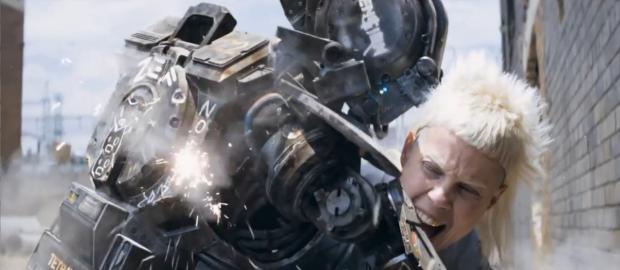An erratic but underwhelming “Chappie” hit theater screens
The opening of Neill Blomkamp’s “Chappie” sweeps across multiple stories in multiple places in early stage apocalypse-Johannesburg, South Africa. A helicopter fleet of robocops dives from the sky and blasts through a collection of menacing gangsters. It’s a lovely, frantic movement of action, editing and scoring.
And then everything goes wrong after that. It’s common for critics to wish that movie characters would grow brains. This time, it’s only when a police robot named “Chappie” swallows a tasty thumb drive of artificial intelligence that the movie loses its mind.
With crime rates soaring, South Africa has turned policing over to a force of nearly indestructible robots. Among their designers is Deon Wilson, a pencil-bodied nerd with dreams of artificial intelligence, robots that can think and feel. After a crazy night of coding, he hits his goal. His computer blares the message “consciousness created” (or somesuch), just like a 404 error. The nature of intelligence and artificial intelligence has bedeviled philosophers for years, but darn it, this computer knows it when it sees it. I want that computer for Christmas!
To test his new invention, Deon steals an abandoned robot from the corporation he works for. As high-security military-industrial companies go, Tetravaal is a bit of a mess. For one thing it has a very liberal handgun policy. The Employee Most Likely to Flip and Shoot Everybody, a gruff jarhead cartoon played by Hugh Jackman, gets to carry a pistol to his cubicle each day. Also, being accused of a major security breach – like stealing a robot and other things – doesn’t mean anyone is going to invalidate your access card anytime soon. With all heck breaking loose late in the film, “Chappie” chases a villain into company headquarters. Rather than just bust down the door, he’s thoughtful enough to try Deon’s access card. And boom: the card still works!
One day while Deon uses a company van for high-tech larceny in the name of science, a funny thing happens. the unassembled “Chappie” is hijacked by a group of criminals who frequent the same hair stylists as the Mad Max series (putting the barber in barbarism since 1979). Instead of becoming the sensitive artistic pushover envisioned by his creator, “Chappie” bonds with this criminal family. Rather than RoboCop, he becomes RoboCon.
Movies can have a screw loose in a good way. The original Mad Max (which seems to be an inspiration here) was one of them. But the Mad Max films only appear chaotic – they’re very economic films. While “Chappie” sometimes matches that intensity, it never matches the smoothness. Particularly annoying are the ways that things happening in one storyline do not affect things happening in other places and other storylines. Characters act one way in one location and completely differently in another. And the villains (like Jackman’s jarhead) have nothing else to do but villainize.
Many of Blomkamp’s talents as filmmaker are present, also. Like “District 9,” “Chappie” blends visual effects with real people and settings brilliantly. The CG in his movies is the type that scrapes the floor. The robot’s movements, acted by Blomkamp favorite Sharlto Copley, are noticeably fluid. The South African director also has a joyful penchant for inserting small bits of visual humor. Check out the license plate on the van belonging to the criminal family.
Yet all of this skill is put to little thematic effect. Sci-fi works best when it is saying things that are otherwise difficult to say. Blomkamp uses it mainly for social observations that are not particularly deep or original. “Chappie” needs more of a mind of its own.


